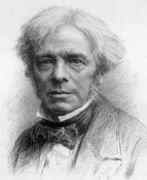Person: Faraday, Michael

Michael Faraday was an English physicist whose discoveries in electricity had an enormous influence on the development of mathematics.
Mathematical Profile (Excerpt):
- The religious influence was important for Faraday since the theories he developed later in his life were strongly influenced by a belief in a unity of the world.
- Michael attended a day school where he learnt to read, write and count.
- In 1805, after a year as an errand-boy, Faraday was taken on by Riebau as an apprentice bookbinder.
- From 1810 Faraday attended lectures at John Tatum's house.
- In 1812 Faraday attended lectures by Humphry Davy at the Royal Institution and made careful copies of the notes he had taken.
- These lectures would become Faraday's passport to a scientific career.
- When his apprenticeship ended in October 1812, Faraday got a job as a bookbinder but still he attempted to get into science and again he took a somewhat ambitious route for a young man with little formal education.
- Davy, unlike Banks, replied to Faraday and arranged a meeting.
- Shortly after the interview Davy's assistant had to be sacked for fighting and Davy sent for Faraday and invited him to fill the empty post.
- In 1813 Faraday took up the position at the Royal Institution.
- In October 1813 Davy set out on a scientific tour of Europe and he took Faraday with him as his assistant and secretary.
- Faraday met Ampère and other scientists in Paris.
- Heading north again they visited Milan where Faraday met Volta.
- On his return to London, Faraday was re-engaged at the Royal Institution as an assistant.
- Faraday was made Superintendent of the House and Laboratory at the Royal Institution and given additional rooms to make his marriage possible.
- The year 1821 marked another important time in Faraday's researches.
- Davy became interested and this gave Faraday the opportunity to work on the topic.
- It is Faraday's work on electricity which has prompted us to add him to this archive.
- However we must note that Faraday was in no sense a mathematician and almost all his biographers describe him as "mathematically illiterate".
- Well, it was Faraday's work which led to deep mathematical theories of electricity and magnetism.
- In particular the remarkable mathematical theories on the topic developed by Maxwell would not have been possible without Faraday's discovery of various laws.
- In the ten years from 1821 to 1831 Faraday again undertook research on chemistry.
- This was a difficult time for Faraday since Davy was at this time President of the Royal Society and could not see the man whom he still thought of as his assistant as becoming a Fellow.
- Faraday never held the incident against Davy, always holding him in the highest regard.
- In 1831 Faraday returned to his work on electricity and made what is arguably his most important discovery, namely that of electro-magnetic induction.
- In 1832 Faraday began to receive honours for his major contributions to science.
- During this period, beginning in 1833, Faraday made important discoveries in electrochemistry.
- The extremely high workload eventually told on Faraday's health and in 1839 he suffered a nervous breakdown.
- Faraday's ideas on lines of force had received a mathematical treatment from William Thomson.
- He wrote to Faraday on 6 August 1845 telling him of his mathematical predictions that a magnetic field should affect the plane of polarised light.
- Faraday had attempted to detect this experimentally many years earlier but without success.
- By the mid 1850s Faraday's mental abilities began to decline.
- At around the same time Maxwell was building on the foundations Faraday had created developing a mathematical theory which would always have been out of reach for Faraday.
- However Faraday continued to lecture at the Royal Institution but declined the offer of the Presidency of the Royal Society in 1857.
- These two final series of lectures by Faraday were published and have become classics.
- The Christmas lectures at the Royal Institution, begun by Faraday, continue today but now reach a much greater audience since they are televised.
- A museum, adjacent to the laboratory, houses a unique collection of original apparatus arranged to illustrate the most important aspects of Faraday's immense contribution to the advancement of science in his fifty years at the Royal Institution.
Born 22 September 1791, Newington Butts, Surrey (now London) England. Died 25 August 1867, Hampton Court, Middlesex, England.
View full biography at MacTutor
Tags relevant for this person:
Origin England, Physics
Thank you to the contributors under CC BY-SA 4.0! 

- Github:
-

- non-Github:
- @J-J-O'Connor
- @E-F-Robertson
References
Adapted from other CC BY-SA 4.0 Sources:
- O’Connor, John J; Robertson, Edmund F: MacTutor History of Mathematics Archive
